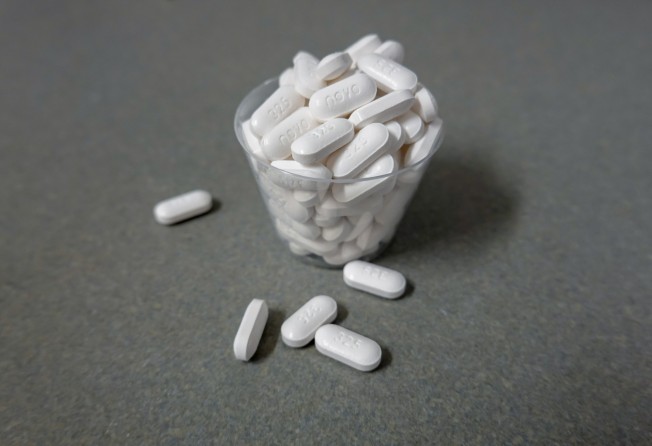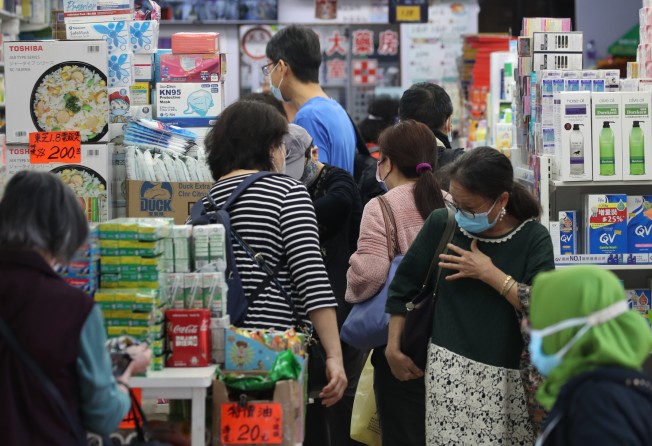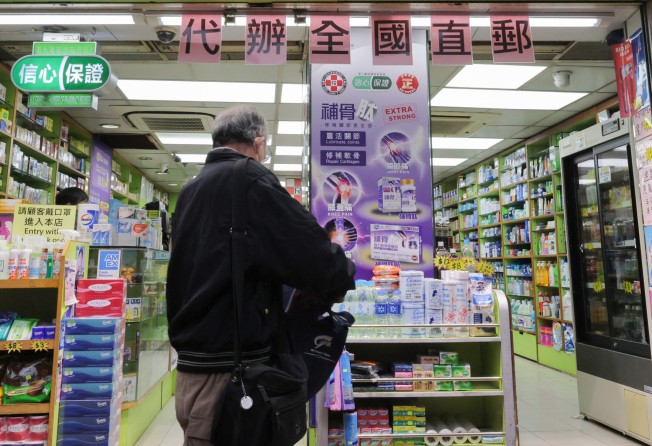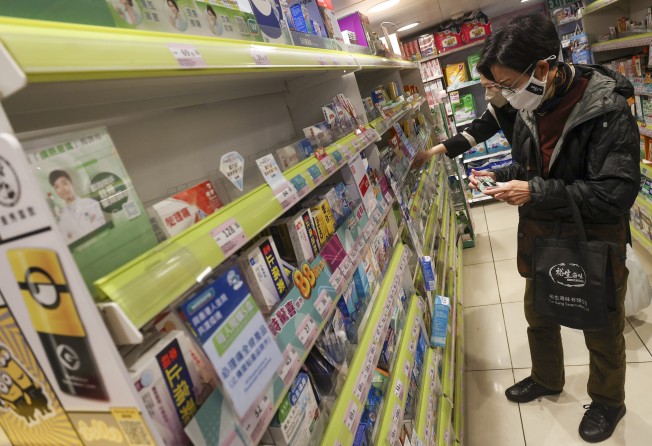
Medicines across the border: Hong Kong pharmacies that deliver drugs to mainland China may be sidestepping the law
- Surge in China’s Covid-19 infection rate moves Hongkongers to send medicines to families, friends
- Pharmacies use logistics companies, couriers to get around need for licence to export medicines

Pharmacies are taking legal risks by offering to deliver medicine to people in mainland China, which has suffered a surge in Covid-19 infections, with customs officials saying unlicensed export of drugs is illegal.
The news came after pandemic restrictions on the mainland last week were eased, which triggered a jump in demand for painkillers and other medicine used to treat Covid-19 symptoms, and many cities have reported serious shortages.
Some Hong Kong residents have snapped up the drugs at city pharmacies to send to friends and relatives across the border, and many have used the firms’ mailing services.
But the Hong Kong Customs and Excise Department said the export of medicines needed a licence from the Department of Health and only those with a drug trader licence could apply for it.
Travellers with medicines in their bags might be exempted from that requirement if the amount was considered reasonable, it added.

Investigations by the Post discovered several pharmacies in the Wan Chai area of the city that offered a mail service, charging HK$100 to HK$180 per kilogram of drugs.
An employee at a pharmacy in Causeway Bay said it had been overwhelmed over the past week by orders to dispatch drugs to the mainland.
“If you place an order now, the parcel will only arrive in February at the earliest,” said the employee, who declined to say how the drugs would be delivered or if the pharmacy had the necessary licence.

A staff member at a Wan Chai pharmacy said medicine would be sent to Macau before being taken in personal luggage to neighbouring mainland city, Zhuhai.
Couriers would deliver the medicine to the recipients from Zhuhai and the employee said the process would take about 10 days.
People in Macau are allowed to cross the border into mainland China without having to undergo quarantine or take a polymerase chain reaction test.
The employee declined to reveal if the shop had an export licence, saying only that they had a way to do it.

Another pharmacy in Wan Chai said it would take up to a month to send medicine across the border, with a logistics company taking care of the licence and using a mainland courier.
“But we can’t guarantee a successful delivery. It could be sent back from the border. It depends on customs, not us,” an employee said. “Even if you have a licence, mainland customs could still send it back, they are very alert and strict these days.”
A pharmacy in Yuen Long in the New Territories promised successful delivery inside 14 days at a charge of HK$120 a kilogram.
A staff member claimed there was no need for the export licence, but there might be an “additional taxation charge” of around HK$100 if mainland customs intercepted the parcel.
The Post found one pharmacy in Wan Chai which refused to ship medicines on the grounds it was illegal.
Lam Wai-man, chairman of the Hong Kong General Chamber of Pharmacy, said logistics companies were unlikely to have the licence and it was impossible for Hongkong Post and major couriers to accept drugs.
“If logistics companies are offering the service to ship medicines, they most probably are doing it under the table. It’s illegal,” he said.
Increased demand has led to shortages of some medicines, especially the Panadol brand of the painkiller paracetamol, although the situation has improved.

“People realise that many kinds of drugs contain paracetamol and they work just as well,” Lam said.
Chamber vice-chairman Cheung Tak-wing said the export licence was difficult to apply for, and recipients on the mainland would also have to fulfil certain requirements to receive the parcels.
He added supplies of Panadol remained tight as there had been a fourfold increase in customers buying fever and pain relief drugs.
Hong Kong customs said it conducted checks and monitored passengers, cargo, postal packets and other items at a variety of control points.
Officials said they were in close touch with other departments to increase the exchange of intelligence and conduct joint operations to foil attempts to smuggle controlled items.
Customs officers are also in close contact with Hongkong Post to increase enforcement against the export of controlled items by parcel.
But some Hongkongers said they preferred to take medicines to friends and relatives on the mainland in person, even though it meant five days of quarantine.
Ng Hung-leung, 32, went to about a dozen pharmacies and spent more than HK$3,000 in a single day to buy medicine, rapid antigen test kits and masks for relatives who had tested positive for the coronavirus in Fujian.
“I did not choose the delivery service because it’s too slow, my relatives would have recovered by the time it got there,” the vice-president of an investment company explained.
Lucy Lee, 37, a WeChat business agent for skin care products, filled a suitcase with medicine and handed it to a friend, who will pass it to her family in Fujian province during the Lunar New Year holiday next month.
“I no longer use delivery companies because they are too slow and it’s now easier to go to the mainland,” she said.
Meanwhile, Hong Kong on Sunday logged 16,023 new infections, 876 of which were imported, and 40 more deaths. The city’s Covid-19 tally stands at 2,354,920 cases and 11,171 related fatalities.
The judiciary announced on Sunday that Chief Justice Andrew Cheung Kui-nung had tested positive for Covid-19 through a rapid antigen test and was undergoing isolation. He last went to work on Friday and wore a mask. He has no recent travel history.